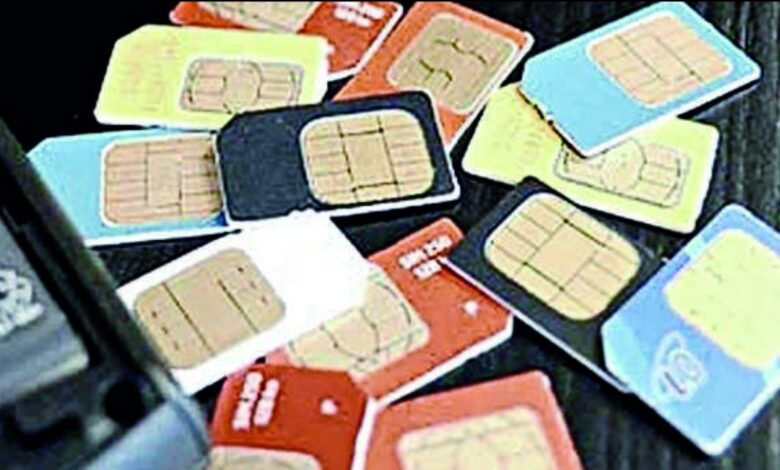Telecommunication
Punjab and Haryana High Court makes a ‘SIM card’ request to telecom ministry

Punjab and Haryana High Court has asked the central government to limit the number of prepaid SIM cards to one per person. Issuing an interim order in the Sumit Nandwani V/S State of Haryana, the high court said that if the Ministry of Telecommunication implements such a restriction, it could effectively curb cybercrime incidents, consequently reducing financial fraud and the exploitation of individuals and their assets, and India’s image.
The high court also denied bail plea of Sumit Nandwani, a Madhya Pradesh resident arrested in a cybercrime case in Haryana.
Scammer had 35 SIM card in his name
As per an affidavit, filed by Dr. Rajesh Mohan, IPS, Assistant Superintendent of Police, Nandwani had 35 prepaid SIM cards in his name that were used to cheat people. Out of these, 12 SIM cards are still active, the police investigation revealed.
The high court says this raises concerns regarding the accused acquisition of a significant quantity of prepaid SIM numbers and the techniques deployed by him to take advantage. It also prompts “scrutiny as to why there is absence of governmental measures restricting individuals to a single prepaid SIM card, and the rationale behind permitting the issuance of prepaid SIM cards to entities such as firms, associations, organisations and companies.”
How many SIMs can one get on a single ID?
According to a Department of Telecommunications (DoT) regulation, an individual can have a maximum of 9 SIM cards on a single ID. The Aadhaar card is a legal document that telecom carriers accept when providing new SIM cards.
The high court, in its order, asks “Why does the Ministry of Telecommunication permit individuals, firms, or companies to acquire multiple prepaid SIM cards under their name?”.
“Given the Aadhar Card is exclusively linked to a single SIM card for OTP generation, there seems to be no justification for the issuance of multiple prepaid SIM cards,” the court says.
Large proportion of cyber frauds occur via prepaid numbers: Court
In its order, the high court highlights the rising number of cybercrimes in the country. “According to reports, cybercrime predominantly takes place through prepaid SIM cards rather than post-paid SIM cards or landlines,” it says.
“These encompass a range of scams such as counterfeit tech support services, fraudulent Amazon and gift card schemes, insurance fraud, courier frauds, and the unlawful conversion of cyber proceeds into cryptocurrencies like Bitcoin. Notably, a considerable proportion of these illicit endeavours are orchestrated via mobile devices,” the high court adds.
Court suggests limiting SIM card to only one per ID
To address the issue of multiple SIM cards, the court suggested restricting prepaid SIM cards to one per individual. It suggests that the Ministry of Telecommunication could provide a window for telecom service providers to validate a single SIM card linked to an Aadhar card.
Furthermore, SIM card holders could be given the option to convert this validated SIM card into a post-paid one, with a directive for service providers to disconnect all other prepaid SIM cards by a specified deadline
In case of minors, the high court says, their parents and caretakers can be given an option to obtain prepaid SIM cards associated with their Aadhaar cards, acting as legal guardians. Similarly, foreign nationals should be entitled to acquire a single prepaid SIM card, contingent upon the verification and validation of their passports through OTP.
The high court also denied bail plea of Sumit Nandwani, a Madhya Pradesh resident arrested in a cybercrime case in Haryana.
Scammer had 35 SIM card in his name
As per an affidavit, filed by Dr. Rajesh Mohan, IPS, Assistant Superintendent of Police, Nandwani had 35 prepaid SIM cards in his name that were used to cheat people. Out of these, 12 SIM cards are still active, the police investigation revealed.
The high court says this raises concerns regarding the accused acquisition of a significant quantity of prepaid SIM numbers and the techniques deployed by him to take advantage. It also prompts “scrutiny as to why there is absence of governmental measures restricting individuals to a single prepaid SIM card, and the rationale behind permitting the issuance of prepaid SIM cards to entities such as firms, associations, organisations and companies.”
How many SIMs can one get on a single ID?
According to a Department of Telecommunications (DoT) regulation, an individual can have a maximum of 9 SIM cards on a single ID. The Aadhaar card is a legal document that telecom carriers accept when providing new SIM cards.
The high court, in its order, asks “Why does the Ministry of Telecommunication permit individuals, firms, or companies to acquire multiple prepaid SIM cards under their name?”.
“Given the Aadhar Card is exclusively linked to a single SIM card for OTP generation, there seems to be no justification for the issuance of multiple prepaid SIM cards,” the court says.
Large proportion of cyber frauds occur via prepaid numbers: Court
In its order, the high court highlights the rising number of cybercrimes in the country. “According to reports, cybercrime predominantly takes place through prepaid SIM cards rather than post-paid SIM cards or landlines,” it says.
“These encompass a range of scams such as counterfeit tech support services, fraudulent Amazon and gift card schemes, insurance fraud, courier frauds, and the unlawful conversion of cyber proceeds into cryptocurrencies like Bitcoin. Notably, a considerable proportion of these illicit endeavours are orchestrated via mobile devices,” the high court adds.
Court suggests limiting SIM card to only one per ID
To address the issue of multiple SIM cards, the court suggested restricting prepaid SIM cards to one per individual. It suggests that the Ministry of Telecommunication could provide a window for telecom service providers to validate a single SIM card linked to an Aadhar card.
Furthermore, SIM card holders could be given the option to convert this validated SIM card into a post-paid one, with a directive for service providers to disconnect all other prepaid SIM cards by a specified deadline
In case of minors, the high court says, their parents and caretakers can be given an option to obtain prepaid SIM cards associated with their Aadhaar cards, acting as legal guardians. Similarly, foreign nationals should be entitled to acquire a single prepaid SIM card, contingent upon the verification and validation of their passports through OTP.



